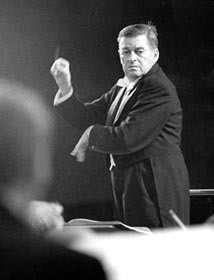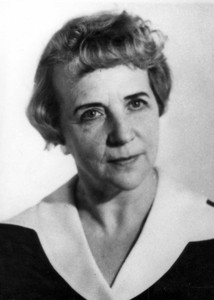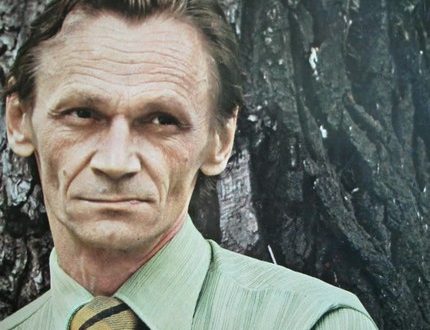
Jaroslav Krombholc |
Jaroslav Krombholc

Until relatively recently – some fifteen years ago – the name of Yaroslav Krombholtz was not known to a wide circle of music lovers. Today he is rightfully considered one of the world’s leading opera conductors, a worthy successor to Vaclav Talich and a successor to his work. The latter is natural and logical: Krombholtz is Talikh’s pupil not only in the conducting school at the Prague Conservatory, but also in the National Theatre, where he was an assistant to the remarkable master for a long time.
Krombholtz was apprenticed to Talih as a young but already well-educated musician. He studied composition at the Prague Conservatory with O. Shin and V. Novak, conducting with P. Dedechek, attended the classes of A. Khaba and listened to lectures by 3. Nejedla at the Faculty of Philosophy of Charles University. At first, however, Krombholtz was not going to become a conductor: the musician was more attracted to the composition, and some of his works – a symphony, orchestral suites, a sextet, songs – are still heard from the concert stage. But already in the forties, the young musician paid the main attention to conducting. While still a student, he first got the opportunity to conduct opera performances of the “Talikhov repertoire” at the People’s Theater and tried to penetrate the secrets of his mentor’s skill.
The independent work of the conductor began when he was only twenty-three years old. In the city theater of Pilsen, he staged “Jenufa”, then “Dalibor” and “The Marriage of Figaro”. These three works formed, as it were, the foundation of his repertoire: three whales – Czech classics, modern music and Mozart. And then Krombholtz turned to the scores of Suk, Ostrchil, Fibich, Novak, Burian, Borzhkovets – in fact, very soon all the best that was created by his compatriots entered his repertoire.
In 1963, Krombholtz became the chief conductor of the theater in Prague. Here Krombholtz grew into a brilliant interpreter and propagandist of Czech opera classics, a passionate seeker and experimenter in the field of modern opera, as he is known today not only in Czechoslovakia, but also abroad. The conductor’s permanent repertoire includes most operas by Smetana, Dvorak, Fibich, Foerster, Novak, works by Janáček, Ostrchil, Jeremias, Kovarovits, Burian, Sukhoń, Martin, Volprecht, Cikker, Power and other Czechoslovak composers, as well as Mozart, who still remains one of the artist’s favorite authors. Along with this, he pays much attention to Russian operas, including Eugene Onegin, The Snow Maiden, Boris Godunov, operas by contemporary authors – Prokofiev’s War and Peace and The Tale of a Real Man, Shostakovich’s Katerina Izmailova. Finally, recent productions of R. Strauss’s operas (Salome and Elektra), as well as A. Berg’s Wozzeck, earned him a reputation as one of the best connoisseurs and interpreters of the contemporary repertoire.
The high prestige of Krombholtz is confirmed by his success outside of Czechoslovakia. After a number of tours with the troupe of the People’s Theater in the USSR, Belgium, East Germany, he is constantly invited to conduct performances in the best theaters in Vienna and London, Milan and Stuttgart, Warsaw and Rio de Janeiro, Berlin and Paris. Productions of Her Stepdaughter, Katerina Izmailova, The Bartered Bride at the Vienna State Opera, Cikker’s Resurrection at the Stuttgart Opera, The Bartered Bride and Boris Godunov at Covent Garden, Katya Kabanova were especially successful. ”and“ Enufa ”at the Netherlands Festival. Krombholtz is primarily an opera conductor. But still he finds time for concert performances, both in Czechoslovakia and abroad, especially in England, where he is very popular. A particularly significant part of his concert programs is occupied by the music of the XNUMXth century: here, along with Czechoslovak composers, are Debussy, Ravel, Roussel, Millau, Bartok, Hindemith, Shostakovich, Prokofiev, Kodai, F. Marten.
Describing the creative image of the artist, critic P. Eckstein writes: “Krombholtz is first of all a lyric conductor, and all his searches and achievements are marked by a certain softness and beauty. But, of course, the dramatic element is also not his weak point. His recording of excerpts from Fiebich’s musical drama The Bride of Messina testifies to this, as, indeed, does the wonderful production of Wozzeck in Prague. Poetic moods and luxurious sounds are especially close to the talent of the artist. This is felt in Dvořák’s Rusalka, recorded by him and recognized by critics as perhaps the most perfect interpretation of the work. But in his other recordings, such as the opera “Two Widows”, Krombholtz shows his full sense of humor and grace.”
L. Grigoriev, J. Platek, 1969





